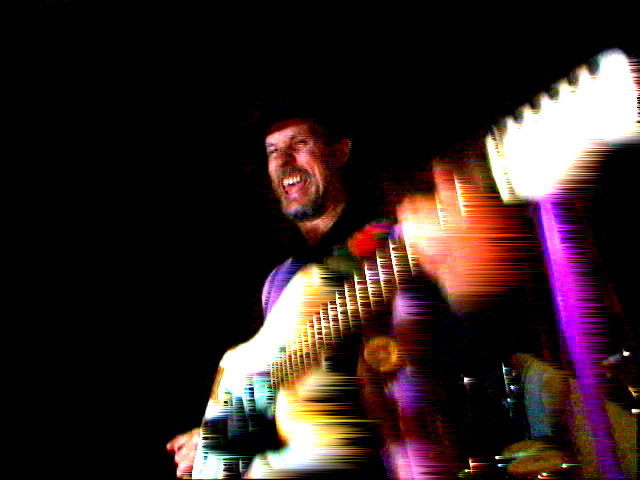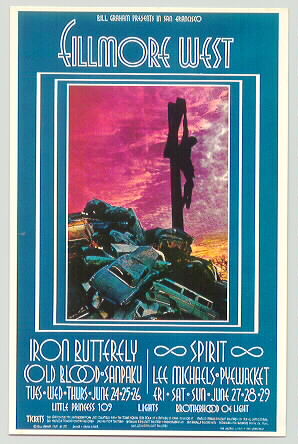

1. Speaking to you at Cavestomp 2001, you mentioned some of your family roots were in South Wales, UK - can you expand on this and whether you will come over to the UK?
My step-mom and all her family are from a little town south of Cardiff. We will be playing Kent, England and I hope much of my British family will attend.
2. How did you get your start in the music business?
I saw the Beatles movie "Help" in the summer of 1965 and was so blown away by the girls screaming that I said "I gotta do this!" (I found out later that John Lennon had a similar experience when he went to a movie theater and saw Elvis Presley.) Soon after, I bought my first guitar at the local drugstore and started my first band called "The Clouds" in January 1966. I was 14 at the time and was living in Marin County, just north of San Francisco, CA. I never took guitar lessons but learned by ear listening to 33 1/3 rpm records playing them on 16 rpm (slowing the speed down). I learned Jimi Hendrix and Eric Clapton licks first. My mom played the piano since she was three and I heard music all my growing up years. It was from her that I got my love of music.
3. Who did you play with in the 60s / 70s and were you disappointed the bands never made it big?
In 1967, I was asked to play with a band called "Pyewacket". We played with Steppenwolf when "Born To Be Wild" came out. I was sixteen years old. Many people asked "You're only sixteen years old?" We went on to play shows in Golden Gate Park in San Francisco, the Fillmore West and the Avalon Ballroom with bands like The Grateful Dead, Jefferson Airplane, The Youngbloods, Buffalo Springfield, Spirit and Lee Michaels.

Eventually in 1969, our band Pyewacket did a midwest tour with the Beach Boys and Paul Revere and the Raiders. We were offered a recording contract with Brother Records, the Beach Boys label (part of Warner Brothers) but the band broke up before the deal was set in stone.
Although we played some great shows for thousands of people, I was disappointed that we missed the brass ring. In the 70s, I moved from northern CA to the north Hollywood area. I spent several years getting integrated into a new scene, working on solo projects, pursued a record deal (with no avail).
Finally in 1978, I got connected to the Keane Brothers through and old friend Bill Champlin - soon to be the lead singer for the band "Chicago". After joining with the Keane Brothers, I worked on recordings with David Foster when his star was first rising. I worked on projects geared towards Barbara Streisand, Eagles and worked with David Foster and Lionel Richie.
Eventually, I made two albums on CBS with the Keane Brothers. Bob Keane, their father, produced "La Bamba" and "I Fought The Law" and owned Delphi Records. The band broke up in 1983 and I started producing music for film and television a few years later. Prior to this, Sister Sledge recorded my song "My Special Way" on their album following "We Are Family".
4. What other instruments do you play?
I compose and program on keyboards. I play bass and play a 1965 Fender jazz bass that I bought in 1970. I have also been a lead singer since I picked up the guitar in 1965.
5. What types of music / performers have influenced your playing style?
My roots are The Beatles, Jimi Hendrix, Eric Clapton and Bill Chmplin and the Sons of Champlin. Most recently, Michael W. Smith, Steven Curtis Chapman and Amy Grant.
6. How did you know the band members of the Electric Prunes and how did you eventually hook up with them to become a permanent band member?
By friend and fellow musician Joe Dooley with whom I have been playing gigs with for over 25 years off and on but didn't realize he had been with the Electric Prunes in the past. Joe approached me several years back about a vision he had to put the Prunes back together. At that time, he had not spoken to the band members in 15-20 years. Also, at that time, I was not interested because of prior commitments.
Last year, Joe contacted me to play on a recording to present to the Prunes after finally becoming reconnected with them. He played the recording for James and Mark and the rest is history!
7. How did you get to record with the reformed Prunes?
Joe Dooley played a song we recorded in which I played bass and guitar and the Electric Prunes commented that I sounded a lot like their original guitar player. They asked Joe to invite me to the recording studio to record on the new album "Artifact".
8. What was it like to record with the band?
It was bizarre……when I first arrived at James's studio near Santa Barbara on a beautiful ranch in the Santa Barbara Mountains. The first thing they thing they had me do after we were all introduced was to play a backward guitar through a new effects box I had never seen. What a way to start a musical relationship! After I got the hang of recording strange textures and unique sounds, I ripened into a "prune". This was especially timely since I also just turned 50!
9. Did you get involved in writing any material whilst recording with them?
Not yet.
10. Do you have freedom to play what you want?
Somewhat.
11. What do you think you contribute to the band?
Thirty seven years of God-given gift. Energy, character, spirit and encouragement.
12. What's it like playing live with The Electric Prunes and how is it different from other groups you've played with?
It is wonderful to play with a band of historical value. Also it is exciting to play with a band with whom you hear applause before the first note is even played! When I tell people I'm playing with The Electric Prunes I get one of two responses : either "Wow!" or "Who?" (this kind of explains my life!).
I am honoured to play with them and it is great to be in the Prune family. It only took me 35 years, but I am going to finally make it in the sixties!
13. Can you explain what the Voxfest and Cavestomp experiences were like? Also, how did the two gigs differ - do you feel the band matured as a live outfit between the concerts?
Voxfest was like going back to the 60s in excitement and environment. Cavestomp was amazing - to be in the Big Apple for the first time, to play for a 60s crowd from all over the world and to hear Little Steven raving about us and comparing us to the Beatles and the Stones's live performances of the 60s. The band definitely matured between Voxfest and Cavestomp.
14. Are you happy with the music you play live and whether there are certain songs you don't like playing?
Overall, I'm happy to take on the challenge of playing music with unusual textures and psychedelic overtones. There was one song on the new album that I didn't feel comfortable with the lyric content and the band was kind enough to take note of my convictions.
15. What is it like being the Prunes's second lead guitarist?
Different than what I am doing the majority of the time which is band production, gigs, etc. because I usually I am the only guitar player / producer / composer / music director.
16. How do you think you compliment Ken on lead guitar?
I try my best to reinforce and support him rhythmically as well as harmonize.
17. Do you think the music of the band is still viable in the 2002?
Yes, the Prunes are fermenting into the finest 60s wines!
18. Who have you recorded / performed with in additional to the Electric Prunes recently?
Currently I am producing a record in which Leland Skilar (bass player for Faith Hill, James Taylor, Phil Collins,etc.), Michael Botts (Bread) and Jai Wending (music director for Madonna and Michael Jackson) are participating. In 1999, I produced an album called "Visionary" on my record label - Mt. Temalpais Records. It has been selling worldwide for three years now.
